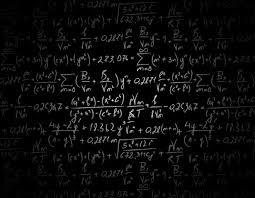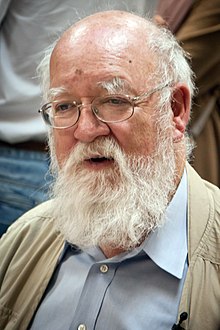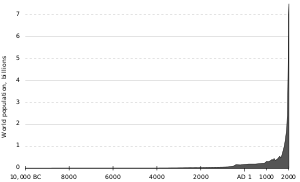The current state of the science of consciousness
In order to distract from physics a little, temporarily change the subject. I will need the concept of “ philosophical zombie ” - it would probably have had to be explained for a long time, but the series “The World of the Wild West” came to the rescue:

Actually, the very idea of the creators of the theme park was precisely the exploitation of such zombies - machines that are no different from people in their behavior, but feel nothing and are unconscious. What is consciousness all about?
We are interested in the most ancient, most primitive part of consciousness, which gives us sensations. Sometimes it is called Qualia . ( Hereinafter I give links to Russian wiki pages when they are full enough, but it is always better to read the original in English ) It’s interesting to read the wiki, but you shouldn’t expect from it formally correct definitions. Progress here is slow and so far represents, rather, the delineation of boundaries. And, in my opinion, one of the most important borders was spent by the stern Australian guy, the philosopher from mathematics David Chalmers .
')

I must say that when people come to philosophy from natural sciences, like Chalmers (from mathematics) or Max Tegmark (from physics), then these people write their works in a normal, human language.
The merit of Chalmers was the separation of problems into "simple", such as "how memory works," and into a difficult problem . Of course, simple problems are not simple at all. But they can just be approached at least approximately. A difficult problem is a whole other level. How can we know that my feelings of blue are the same as yours? Maybe they are like red from me, because somewhere in my brain wires are mixed up? How can I be sure that you have a consciousness, and you are not a new model from an amusement park? Or maybe a good half of people are born philosophical zombies? Do cats have consciousness? What about bacteria? How does consciousness appear in the brain?
A difficult problem was known even to Leibniz . Allow me to quote: it must be confused, moreover, it can be determined by the mechanical causes, and it’s have perception, we might enter it as a mill. We must not only be able to find a way out. This is why it must be sought after.
Wiki (and Chalmers) denotes a complex problem, but they don’t say how it differs from a simple one. I figured out how to explain the difference. For a simple problem, we may not know the answer, but we know the format of the answer. For example, how does memory work? Some genius in neuroscience will someday tell the public how neural connections plus some substances store information and how it is extracted.
Here is another example of a simple problem:

These are TOE formulas - the theory of everything, including quantum gravity. Sorry to be so petty. We still do not know what these formulas are, but we are expecting something similar - a crazy professor and a blackboard written in formulas.
Now imagine - you open the Internet and read: a scientistraped a journalist revealed the secret of consciousness! It turns out that consciousness arises in axons during h-capture of a pi-restrictase with its subsequent hydrolysis in a neuron, which leads to the appearance of impulses of a certain shape.
Pause
So how? It became clearer? I would chuckle and say, well, yes, some kind of chemical reaction, impulses, this is so full of things, where does the consciousness arise? Agree, whatever the text about how consciousness arises, in any case, nothing but another disappointment will not give us this text. I.e,
for a complex problem, not only do we not know the answer,
but do not even know the format of the answer
© my
Actually, for a physicist, the presence of consciousness as some kind of invisible, unregistered, immeasurable substance is akin to the statement that the space is filled with invisible multi-colored unicorns that do not produce gravity and do not react with matter in any way. Such a theory should be immediately recognized as unscientific and cut out of Occam's razor if ...
If it were not so self-evident that we have a consciousness. Eyes can deceive us, hearing too. Remember Neo connected to the hardware? The only thing Neo was right about, even being in the matrix and not knowing about it, is that he has a consciousness.
Functionalism suggests that consciousness is somehow born in the process ofcomputing thinking. Philosophical zombies are impossible, because if they behave like people, then they have a consciousness (duck typing). The approach is purely mechanistic and partly ostrich, because it really does not explain anything. You can also give two objections:
Panpsychism approaches the problem from the other side. There is no process creating consciousness. Consciousness is initially in everything, in bacteria and even an atom. Strangely enough, this point of view is quite popular - apparently, from despair. It is very incomprehensible to me how problems with the additivity of consciousness are solved with this approach.
Consciousness can not understand itself suggests that consciousness can not, in principle, to understand what consciousness. Perhaps it is available to the consciousness of a higher rank, which also cannot understand itself. Something similar to the theorem of Gödel
Finally, the philosopher Daniel Dennett

He solves the problem in an original way - he denies the existence of consciousness at all, claiming that it is an illusion. Many even suspect that Daniel is in fact a philosophical zombie. It's funny that when he wrote a book explaining his views, Consciousness Explained Chalmers and others dubbed it Consciousness Ignored and Consciousness Explained Away. I do not think that he actually denies the existence of consciousness in himself - most likely, he is just a troll.
At least this is important for mind upload. What guarantees are there that after the dive process we won’t get zombies? And if you clone a person embedded in a computer, how many consciousnesses will there be? If so, is it possible to erase one consciousness? Does erasure hurt during erasure?
The connection of consciousness with the Doomsday Theorem is very interesting: If your consciousness is randomly infused into an arbitrary body, and the bodies are much more by the end of the development of civilization:

then we most likely live close to the end of the world.

However, it depends on some assumptions, Self-sampling assumption vs Self Indication Assumption . This will help you to solve the Sleeping Beauty task!

Actually, the very idea of the creators of the theme park was precisely the exploitation of such zombies - machines that are no different from people in their behavior, but feel nothing and are unconscious. What is consciousness all about?
We are interested in the most ancient, most primitive part of consciousness, which gives us sensations. Sometimes it is called Qualia . ( Hereinafter I give links to Russian wiki pages when they are full enough, but it is always better to read the original in English ) It’s interesting to read the wiki, but you shouldn’t expect from it formally correct definitions. Progress here is slow and so far represents, rather, the delineation of boundaries. And, in my opinion, one of the most important borders was spent by the stern Australian guy, the philosopher from mathematics David Chalmers .
')

I must say that when people come to philosophy from natural sciences, like Chalmers (from mathematics) or Max Tegmark (from physics), then these people write their works in a normal, human language.
The merit of Chalmers was the separation of problems into "simple", such as "how memory works," and into a difficult problem . Of course, simple problems are not simple at all. But they can just be approached at least approximately. A difficult problem is a whole other level. How can we know that my feelings of blue are the same as yours? Maybe they are like red from me, because somewhere in my brain wires are mixed up? How can I be sure that you have a consciousness, and you are not a new model from an amusement park? Or maybe a good half of people are born philosophical zombies? Do cats have consciousness? What about bacteria? How does consciousness appear in the brain?
A difficult problem was known even to Leibniz . Allow me to quote: it must be confused, moreover, it can be determined by the mechanical causes, and it’s have perception, we might enter it as a mill. We must not only be able to find a way out. This is why it must be sought after.
Why is “Complicated Problem” Difficult?
Wiki (and Chalmers) denotes a complex problem, but they don’t say how it differs from a simple one. I figured out how to explain the difference. For a simple problem, we may not know the answer, but we know the format of the answer. For example, how does memory work? Some genius in neuroscience will someday tell the public how neural connections plus some substances store information and how it is extracted.
Here is another example of a simple problem:

These are TOE formulas - the theory of everything, including quantum gravity. Sorry to be so petty. We still do not know what these formulas are, but we are expecting something similar - a crazy professor and a blackboard written in formulas.
Now imagine - you open the Internet and read: a scientist
Pause
So how? It became clearer? I would chuckle and say, well, yes, some kind of chemical reaction, impulses, this is so full of things, where does the consciousness arise? Agree, whatever the text about how consciousness arises, in any case, nothing but another disappointment will not give us this text. I.e,
for a complex problem, not only do we not know the answer,
but do not even know the format of the answer
© my
Occam's razor
Actually, for a physicist, the presence of consciousness as some kind of invisible, unregistered, immeasurable substance is akin to the statement that the space is filled with invisible multi-colored unicorns that do not produce gravity and do not react with matter in any way. Such a theory should be immediately recognized as unscientific and cut out of Occam's razor if ...
If it were not so self-evident that we have a consciousness. Eyes can deceive us, hearing too. Remember Neo connected to the hardware? The only thing Neo was right about, even being in the matrix and not knowing about it, is that he has a consciousness.
What are some ideas for solving a complex problem?
Functionalism suggests that consciousness is somehow born in the process of
- Blindsight - visual information falls out of the minds of such people, but they can bypass obstacles - that is, the video at the lower level is going on - just does not reach consciousness. This is an example of information processing that does not lead to sensation. Similarly, you pull your hand away from the hot before you feel pain.
- The pain itself is also an interesting phenomenon. It is clear that it was created for the self-preservation of living beings. But such a functional explanation completely ignores the fact that pain is unpleasant. The rover can bypass the stones, not because it hurts, but for self-preservation. Why is this feeling unpleasant? Functionalism completely ignores this component.
Panpsychism approaches the problem from the other side. There is no process creating consciousness. Consciousness is initially in everything, in bacteria and even an atom. Strangely enough, this point of view is quite popular - apparently, from despair. It is very incomprehensible to me how problems with the additivity of consciousness are solved with this approach.
Consciousness can not understand itself suggests that consciousness can not, in principle, to understand what consciousness. Perhaps it is available to the consciousness of a higher rank, which also cannot understand itself. Something similar to the theorem of Gödel
Finally, the philosopher Daniel Dennett

He solves the problem in an original way - he denies the existence of consciousness at all, claiming that it is an illusion. Many even suspect that Daniel is in fact a philosophical zombie. It's funny that when he wrote a book explaining his views, Consciousness Explained Chalmers and others dubbed it Consciousness Ignored and Consciousness Explained Away. I do not think that he actually denies the existence of consciousness in himself - most likely, he is just a troll.
Is it important?
At least this is important for mind upload. What guarantees are there that after the dive process we won’t get zombies? And if you clone a person embedded in a computer, how many consciousnesses will there be? If so, is it possible to erase one consciousness? Does erasure hurt during erasure?
The connection of consciousness with the Doomsday Theorem is very interesting: If your consciousness is randomly infused into an arbitrary body, and the bodies are much more by the end of the development of civilization:

then we most likely live close to the end of the world.

However, it depends on some assumptions, Self-sampling assumption vs Self Indication Assumption . This will help you to solve the Sleeping Beauty task!
Source: https://habr.com/ru/post/443002/
All Articles